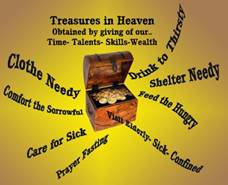June 15 to June 21 - abbey
Main menu:
- Home Page
- Abbey
- Apiary
- Documents
- Monastic
- Spirituality
- Apostleship of the Sea
- Homilies of Pope Francis
June 15 to June 21
Christ became sin for me… it's crazy, but it's beautiful!
“Christian life is not a ‘spa therapy’ to be at peace until Heaven, but it calls us to go out into the world to proclaim that Jesus ‘became’ the sinner to reconcile men with the Father”. These were Pope Francis’ words during his homily at Mass Saturday June 15,
The Christian life is not staying in a corner to carve a road which takes you into heaven, but it's a dynamic that encourages one to stay ‘on the road’ to proclaim that Christ has reconciled us to God, by becoming sin for us. In his usual profound and direct way, Pope Francis focused on a passage from the Letter to the Corinthians, from the day’s liturgy, in which St. Paul is very insistent, almost ‘in a hurry’, uses the term ‘reconciliation’ five times.
What is reconciliation? Taking one from this side, taking another one for that side and uniting them: no, that’s part of it but it's not it ... True reconciliation means that God in Christ took on our sins and He became the sinner for us. When we go to confession, for example, it isn’t that we say our sin and God forgives us. No, not that! We look for Jesus Christ and say: 'This is yours, and I will sin again'. And Jesus likes that!, because it was his mission: to become the sinner for us, to liberate us.
It is the beauty and the ‘scandal’ of the redemption brought by Jesus and it is also the mystery, from which Paul draws zeal that spurs him to move forward telling everyone something so wonderful the love of a God who gave up his Son to death for me. Yet, there is a risk of never arriving at this truth in the moment when we devalue a little the Christian life, reducing it to a list of things to observe and thus losing the ardour, the force of the ‘love that is inside’ of it.
But philosophers say that peace is a certain ordered tranquility: everything is tidy and quiet ... That is not the Christian peace! Christian peace is an uneasy peace, not a quiet peace: it is an uneasy peace, which goes on to carry this message of reconciliation. The Christian Peace pushes us to move forward. This is the beginning, the root of apostolic zeal. Apostolic zeal is not to go forward to persuade and make statistics: this year Christians in this country have grown, in this movement ... Statistics are good, they help, but that is not what God wants from us ,is to persuade... What the Lord wants from us is to announce this reconciliation, which is his own core message.
Concluding his homily the Pope recalled the inner anxiety of Paul. He underlined that which defines the ‘pillar’ of Christian life, namely, Christ became sin for me! And my sins are there in his body, in his soul! This is crazy, but it's beautiful, it's true! This is the scandal of the Cross!
We ask the Lord to give us this concern to proclaim Jesus, to give us a bit of 'that Christian wisdom that was born from His pierced side of love. Just a little to convince us that the Christian life is not a spa therapy: to be at peace until Heaven ... No, the Christian life is the road in life with this concern of Paul. The love of Christ urges us on, it pushes us on, with this emotion that one feels when one sees that God loves us. We ask this grace.
Christian’s magnanimity: Jesus is ‘everything’; anything else is ‘nothing’
“For a Christian, Jesus is ‘all’, and this is the source of his or her magnanimity.” This was the focus of the Pope’s message during Mass, Monday June 17. “If someone slaps you on the right cheek, offer the other cheek also”. Pope Francis focused on Jesus’ earth-
The righteousness that He brings is another kind of justice that is totally different from ‘eye for eye, tooth for tooth’. It’s another justice. This is clear when St. Paul speaks of Christians as “people who have nothing in themselves but possess all things in Christ”. So, Christian security is exactly this ‘all’ that is in Christ. ‘All’ is Jesus Christ. Other things are ‘nothing’ for a Christian. Instead, for the spirit of the world ‘all’ means things: riches, vanities, it means to be ‘well placed’ in society, where Jesus is ‘nothing’. Thus, if a Christian can walk 100 kilometres when he is asked to walk 10, it’s because for him or for her this is ‘nothing’. And with serenity, he or she can give his or her coat when asked for his or her tunic. This is the secret of Christian magnanimity that always goes together with meekness.
A Christian is a person who opens up his or her heart with this spirit of magnanimity, because he or she has ‘all’: Jesus Christ. The other things are ‘nothing’. Some are good, they have a purpose, but in the moment of choice he or she always chooses ‘all’, with that Christian meekness that is the sign of Jesus’ disciples: meekness and magnanimity. To live like this is not easy, because you really do receive slaps! And on both cheeks! But a Christian is meek, a Christian is magnanimous: he or she opens up his or her heart. Sometimes we come across these Christians with little hearts, with shrunken hearts. This is not Christianity: this is selfishness, masked as Christianity. A true Christian knows how to solve this bi-
God’s Kingdom is ‘all’, the other is secondary. And all Christian errors, all the Church’s errors, all our errors stem from when we say ‘nothing’ is ‘all’, and to ‘all’ we say it does not count… Following Jesus is not easy, but it’s not difficult either, because on the path of love the Lord does things in such a way that we can go forward; it is the Lord himself who opens up our heart. This is what we must pray for when we are confronted with the choice of the slap, the coat, the 100 kilometres, we must pray the Lord to open up our heart so that we are magnanimous and meek. We must pray so that we do not fight for small things, for the ‘nothings’ of daily life.
The hard lesson of loving our enemies
“It is hard to love our enemies, but that is exactly what God is asking us to do”, said Pope Francis at Mass Tuesday June 18. Pope Francis began his homily, with a series of questions that encompassed some of the most pressing dramas of humanity: How can we love our enemies? How can we love those who decide to bomb and kill so many people? And again, how can we love those who out of their for love money prevent the elderly from accessing the necessary medicine and leave them to die? Or those who only seek their own best interests, power for themselves and do so much evil? It seems hard to love your enemy, But Jesus asks it of us. This current liturgy, proposes Jesus’ updating of the law, of the law of Mount Sinai with the Law of the Mount of Beatitudes. We all have enemies, but deep down, we too we can become enemies of others. We too often become enemies of others: we do not wish them well. And Jesus tells us to love our enemies! And this is not easy!... we even think that Jesus is asking too much of us! We leave this to the cloistered nuns, who are holy, we leave this for some holy soul, but this is not right for everyday life. But it must be right! Jesus says: No, we must do this! Because otherwise you will be like the tax collectors, like pagans. Not Christians! So how can we love our enemies? Jesus, tells us two things: first look to the Father who makes the sun rise on evil and good and rain fall on the just and unjust. God loves everyone. Jesus tells us to be perfect as the Heavenly Father is perfect, imitate the Father with that perfection of love. Jesus forgives his enemies, does everything to forgive them. Taking revenge is not Christian. But how can we succeed in loving our enemies? By praying. When we pray for what makes us suffer it is as if the Lord comes with oil and prepares our hearts for peace.
We too often become enemies of others: we do not wish them well. And Jesus tells us to love our enemies! And this is not easy!... we even think that Jesus is asking too much of us! We leave this to the cloistered nuns, who are holy, we leave this for some holy soul, but this is not right for everyday life. But it must be right! Jesus says: No, we must do this! Because otherwise you will be like the tax collectors, like pagans. Not Christians! So how can we love our enemies? Jesus, tells us two things: first look to the Father who makes the sun rise on evil and good and rain fall on the just and unjust. God loves everyone. Jesus tells us to be perfect as the Heavenly Father is perfect, imitate the Father with that perfection of love. Jesus forgives his enemies, does everything to forgive them. Taking revenge is not Christian. But how can we succeed in loving our enemies? By praying. When we pray for what makes us suffer it is as if the Lord comes with oil and prepares our hearts for peace.
Pray! This is what Jesus advises us: Pray for your enemies! Pray for those who persecute you! Pray! And say to God: Change their hearts. They have a heart of stone, but change it, give them a heart of flesh, so that they may feel relief and love. Let me just ask this question and let each of us answer it in our own heart: Do I pray for my enemies? Do I pray for those who do not love me? If we say 'yes', I will say, 'Go on, pray more, you are on the right path! If the answer is 'no', the Lord says “Poor thing. You too are an enemy of others!”. Pray that the Lord may change the hearts of those. We could say: “But this person really wronged me”, or “they have done bad things” and this impoverishes people, impoverishes humanity. And following this libe of thought we want to take revenge or that eye for an eye, a tooth for a tooth".
It is true that love for our enemies impoverishes us, because it makes us poor like Jesus, who, when he came to us, lowered himself and became poor for us. Some could argue this was not a good deal if the enemy makes me poorer and of course, according to the criteria of this world, it is not a good deal. But this, is the path Jesus travelled who from rich became poor for us. In this poverty, in this Jesus’ lowering of himself there is the grace that has justified us all, made us all rich. It is the mystery of salvation. With forgiveness, with love for our enemy, we become poorer: love impoverishes us, but that poverty is the seed of fertility and love for others. Just as the poverty of Jesus became the grace of salvation for all of us, great wealth ... let us think of our enemies those who do not wish us well: it would be nice if we offered the Mass for them, Jesus' sacrifice, for them, for those who do not love us. And for us too, so that the Lord teaches us this wisdom which is so hard, but so beautiful, because it makes us look like the Father, like our Father: it brings out the sun for everyone, good and bad. It makes us more like the Son, Jesus, who in his humiliation became poor to enrich us, with his poverty.
Hypocrisy hurts the Church
“Christianity is not simply the study of laws or commands: this is an impediment to understanding and living the truth that God is joy and generosity.” was the message of Pope Francis at Mass on Wednesday, June 19. The hypocrites who “lead the people of God down a dead-
Pope Francis criticized not only the vanity of the scribes and Pharisees, but also those who impose “so many precepts on the faithful. He called them “hypocrites of casuistry,” “intellectuals without talent” who “don’t have the intelligence to find God, to explain God with understanding,” and so prevent themselves and others from entering into the Kingdom of God:
Jesus says: You do not enter yourselves, nor do you allow entrance to others. They are ethicists without goodness, they do not know what goodness is. But they are ethicists, aren’t they? ‘You have to do this, and this, and this . . .’ They fill you with precepts, but without goodness. And those are some of the phylacteries, of the tassels they lengthen, so many things, to make a pretence of being majestic, perfect, they have no sense of beauty. They have no sense of beauty. They achieve only the beauty of a museum. They are intellectuals without talent, ethicists without goodness, the bearers of museum beauty. These are the hypocrites that Jesus rebukes so strongly.
But He doesn’t stop there, In today’s Gospel, the Lord speaks about another class of hypocrites, ‘holy rollers’ [Italian: quelli che vanno sul sacro]: The Lord speaks about fasting, about prayer, about almsgiving: the three pillars of Christian piety, of interior conversion, that the Church proposes to us all in Lent. There are even hypocrites along this path, who make a show of fasting, of giving alms, of praying. I think that when hypocrisy reaches this point in the relation with God, we are coming very close to the sin against the Holy Spirit. These do not know beauty, they do not know love, these do not know the truth: they are small, cowardly. We think about the hypocrisy in the Church: how bad it makes all of us. Instead, take another “icon” for imitation, a person described in another passage of the Gospel: the publican who prayed with humble simplicity, “Have mercy on me, O Lord, a sinner.” This, is the prayer we should say every day, knowing that we are sinners but with concrete sins, not theoretical [sin]. And this prayer, will help us to take the opposite road, the road opposed to the hypocrisy that we are all tempted to.
We think about the hypocrisy in the Church: how bad it makes all of us. Instead, take another “icon” for imitation, a person described in another passage of the Gospel: the publican who prayed with humble simplicity, “Have mercy on me, O Lord, a sinner.” This, is the prayer we should say every day, knowing that we are sinners but with concrete sins, not theoretical [sin]. And this prayer, will help us to take the opposite road, the road opposed to the hypocrisy that we are all tempted to.
But all of us have grace, the grace that comes from Jesus Christ: the grace of joy; of magnanimity, of largesse. Hypocrites do not know what joy is, what largesse is, what magnanimity is.
Prayer is not magic; you cannot pray with enemies in your heart
To pray the Our Father we have to have a heart at peace with our brothers. We don't pray "my Father," but "our Father," because we are not an ‘only child’, none of us are. This was the focus of Pope Francis' homily at Mass Thursday June 20. Pope Francis centered his homily on the Lord’s Prayer, based on the Gospel of the day. Jesus, immediately gives us a piece of advice in prayer: "In praying, do not babble, do not make worldly noises, vain noises”. Prayer is not a magical thing, there is no magic with prayer. Someone once told me that when he went to a witch doctor. They said a lot of words to heal him. But that is ‘pagan’. Jesus teaches us, "We should not turn to Him with so many words," because He knows everything. The first word is ‘Father,’ this is the key of prayer. Without saying, without feeling, that word you cannot pray.
Pope Francis centered his homily on the Lord’s Prayer, based on the Gospel of the day. Jesus, immediately gives us a piece of advice in prayer: "In praying, do not babble, do not make worldly noises, vain noises”. Prayer is not a magical thing, there is no magic with prayer. Someone once told me that when he went to a witch doctor. They said a lot of words to heal him. But that is ‘pagan’. Jesus teaches us, "We should not turn to Him with so many words," because He knows everything. The first word is ‘Father,’ this is the key of prayer. Without saying, without feeling, that word you cannot pray.
To whom do I pray? To the Almighty God? He is too far off. Ah, I can’t hear Him. Neither did Jesus. To whom do I pray? To a cosmic God? That’s quite normal these days, is it not? ... praying to the cosmic God, right? This polytheistic model that comes from a rather light culture ... You must pray to the Father! It is a strong word, 'Father '. You must pray to Him who generated you, who gave you life. Not to everyone: everyone is too anonymous. To you. To me. To the person who accompanies you on your journey: He knows all about your life. Everything: what is good and what is not so good. He knows everything. If we do not start the prayer with this word, not just with our lips but with our hearts, we cannot pray in a Christian language. ‘Father’, is a strong word, but opens the door. At the time of sacrifice, Isaac realized that something was wrong because he was missing a sheep, but he trusted his father and confided his worries to his father’s heart. ‘Father’ is the word that ‘the son’ who left with his legacy and then wanted to return home thought of. And that father sees him come and goes running to him, he threw himself in his arms, to cover him with love. "Father, I have sinned:" this is, the key of every prayer, to feel loved by a father. We have a Father. Very close to us, eh! Who embraces us. All these worries, concerns that we have, let's leave them to the Father, He knows what we need. But, Father, what? My father? No: Our Father! Because I am not an only child, none of us are, and if I cannot be a brother, I can hardly become a child of the Father, because He is a Father to all. Mine, sure, but also of others, of my brothers. And if I am not at peace with my brothers, I cannot say 'Father' to Him. This, explains the fact that Jesus, after having taught us the Our Father, stresses that if we do not forgive others, neither will the Father forgive us our sins. It's so hard to forgive others it is really difficult, because we always have that regret inside. We think, "You did this to me, you wait … and I’ll repay him the favour.”
We have a Father. Very close to us, eh! Who embraces us. All these worries, concerns that we have, let's leave them to the Father, He knows what we need. But, Father, what? My father? No: Our Father! Because I am not an only child, none of us are, and if I cannot be a brother, I can hardly become a child of the Father, because He is a Father to all. Mine, sure, but also of others, of my brothers. And if I am not at peace with my brothers, I cannot say 'Father' to Him. This, explains the fact that Jesus, after having taught us the Our Father, stresses that if we do not forgive others, neither will the Father forgive us our sins. It's so hard to forgive others it is really difficult, because we always have that regret inside. We think, "You did this to me, you wait … and I’ll repay him the favour.”
No, you cannot pray with enemies in your heart, with brothers and enemies in your heart, you cannot pray. This is difficult, yes, it is difficult, not easy. 'Father, I cannot say Father, I cannot'. It’s true, I understand. 'I cannot say our, because he did this to me and this ...' I cannot! 'They must go to hell, right? I will have nothing to do with them'. It’s true, it is not easy. But Jesus has promised us the Holy Spirit: it is He who teaches us, from within, from the heart, how to say 'Father' and how to say 'our'. Today we ask the Holy Spirit to teach us to say 'Father' and to be able to say 'our', and thus make peace with all our enemies.
Treasures we can take with us
“Ask God for the grace of a heart that knows how to love; and do not let yourself be led away by useless treasures.” That was Pope Francis’ message in his homily Friday June 21 at his daily Mass.
The search for the only treasure that you can take with you into the next life is the raison d'être of a Christian, which Jesus explains to His disciples, in today’s Gospel. “Where your treasure is, there also will your heart be.” But, we must be careful not to be confused about true richness. There are risky treasures that threaten to seduce us, but must be left behind, – treasures gathered in life that are destroyed by death. I have never seen a moving van following a funeral procession. But there is a treasure we can take with us, a treasure that no one can take away, – not those things you’ve kept for yourself, but those you have given to others. And that will be our ‘merit’ of Jesus Christ in us! And that we must bring with us. And that is what the Lord lets us bring. Love, charity, service, patience, goodness, tenderness are very beautiful treasures: these we bring with us. The other things,… No.”
So, as the Gospel assures us, the treasure that has value in God’s sight is that which in this life is accumulated in heaven. But Jesus, goes a step further: He joins the treasure to the ‘heart’, He creates a relationship between the two terms. This, is because we have a restless heart, which the Lord made this way to seek Him out. The Lord has made us restless to seek Him, to find Him, to grow. But if it is a treasure that is not close to the Lord, that is not from the Lord, our heart becomes restless for things that simply don’t work, for these treasures . . . So many people, even we ourselves, are restless . . . To have this, to arrive at this in the end, our heart is tired, it is never filled: it gets tired, it becomes sluggish, it becomes a heart without love. t. Let’s think about that. What do I have: a tired heart, that only wants to settle itself, three, four things, a good bank account, this or that thing? This restlessness of the heart always has to be cured.
At this point, Jesus speaks about the ‘eye’, a symbol of the intentions of the ‘heart’, that are reflected in the body: a heart that loves makes the body luminous; a wicked heart makes it dark. Our ability to judge things, depends on this contrast between light and darkness, as is shown also by the fact that from a heart of stone . . . attached to worldly treasures, to selfish treasure, can also become a treasure of hatred, come wars . . . Instead through the intercession of Saint Aloysius Gonzaga, whom the Church remembers today – let us ask for the grace of a new heart . . . a heart of flesh.
All these pieces of the heart that are of stone, may the Lord make them human, with that restlessness, with that good anxiety to go forward, seeking Him and allowing ourselves to be sought by Him. That the Lord might change our hearts! And so He will save us. He will save us from the treasures that cannot help us in the encounter with Him, in service to others, and also will give us the light to understand and judge according to the true treasure: His truth. May the Lord change our heart in order to seek the true treasure and so become people of light, and not of darkness.